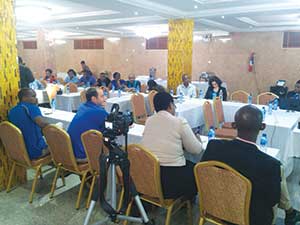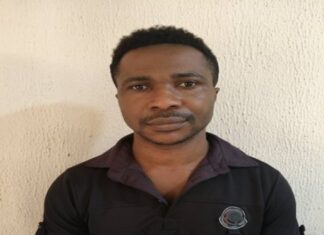With the governorship and House of Assembly elections still ahead, various non-governmental organisations have put up programmes aimed at informing and sensitising the public on major issues that would affect the elections and the way forward. Writes Senior Correspondent, ONYEWUCHI OJINNAKA.

CLEEN Foundation, a non-governmental organisation established in 1998, had in its report in the 10th edition of ‘Election Security Threat Assessment towards 2015 Elections’ released in February, observed key risk factors that require keen attention and action from security agencies. According to the report, in some zones that have been prone to violence such as the Northern part of Nigeria, it could take only a small trigger for violence to erupt, especially in Kaduna and Kano states. States like Ebonyi, Benue, Plateau, and Nasarawa have underlying ethno-religious tensions that could be triggered by political wrangling during the elections, it added.
In addition to the election security risk, other factors stemming from the distribution of permanent voters’ cards (PVCs), campaign and hate speech, response by security agencies to identified threats to election, protection of the franchise of internally-displaced persons (IDPs), and the emergence of alternative security arrangements are as follows:
Perceived partisanship of security institutions: There have been recurring allegations of partisan control and use of security institutions in the country. According to the report, the police, military and the Department of Security Services (DSS) have allegedly been deployed and used in a partisan manner by the federal government, and this could be major threat to security before and after the elections. The feeling of political repression and exclusion from the mainstream security cover of the state could be major risk factors.
It noted that opposition parties are already reacting to the situation, as some state governments have established their own security outfits which could serve as counter-force to the federal security agencies. On the other hand, some groups are vehemently protesting the use of the military for any role in the elections.
Electoral manipulation: In the report, CLEEN Foundation pointed out that vote rigging or perceived rigging will be the major trigger of violence in the region, especially the gubernatorial and presidential elections, adding that the Independent National Electoral Commission (INEC) has sought to forestall the likelihood of rigging through biometric verification and use of card-readers. However, the challenges recorded in the recent field pre-test must urgently be rectified to ensure that the process is efficient and does not result in disenfranchisement as this could be negatively received by prospective voters.
Boko Haram insurgency: In the report, it was agreed that the military remains active in its campaign against the Boko Haram in the North East. The recent declaration of Adamawa State to be free from insurgents is gladdening; however, it is doubtful that such a declaration would be made on Borno and Yobe till after the elections. In the neighbouring North West, Kano, Jigawa and Kaduna remain at the risk of Boko Haram attacks as in the last three years. Different parts of these states have been attacked by Boko Haram. Until the situation in the whole of the North East is addressed, the possibility of more attacks could not effectively be ruled out. This is especially important now that the Boko Haram is being vigorously routed and considering the leaflets allegedly circulated by Boko Haram promising to disrupt the general elections.
Mixed bag on democracy and accountability
In another release, CLEEN Foundation, in collaboration with Practical Sampling International (PSI) and Afrobarometer, an African-led non-partisan research network, conducted a survey on peoples’ views on democracy and accountability ahead of the elections.
According to the release, the findings of the survey show that majority view is in support for democracy, though weaker than two years ago and tempered by high levels of dissatisfaction and low approval ratings for elected officials.
The survey reveals that more than half – about 57 per cent of citizens – posited that Nigeria is a democracy ‘with major problems’ or not a democracy at all. The elected officials at all levels, including the president and members of the National Assembly, got weak approval ratings and are perceived by a majority of citizens as corrupt.
Moreover, most Nigerians do not consider the ballot as an effective means of removing leaders who fail to perform in office and do not see voters as playing a leading role in holding political officials accountable.
Findings
Two-thirds (65 per cent ) of Nigerians favour democracy as the best form of government, a decrease from 69 per cent in 2012, and one in five (21 per cent ) opined that non-democratic forms can sometimes be preferable. While a majority reject non-democratic alternatives, 15 per cent approved military rule, 11 per cent support one-party rule, and nine per cent approved one-man rule.
Findings on the way democracy is practised in Nigeria show that 29 per cent are “very satisfied” or “fairly satisfied” while 68 per cent are “not very” or “not at all” satisfied.
Ahead of the elections, key political office holders received weak approval ratings on their performance, and public perceptions are characterised by low levels of trust and high levels of perceived corruption.
Conduct of police during elections
With a few days to the presidential elections, the Police Service Commission (PSC), in collaboration with CLEEN Foundation and Friedrich Ebert Stiftung last Monday in Lagos held a public sensitisation programme/workshop on the monitoring of police conduct during the general elections.
In his opening remarks, the vice chairman of CLEEN Foundation, Frank Odita, said that the primary purpose of the workshop was to inform the public on mandate of the PSC, ways of making complaints to the commission and what is expected of police officers on electoral duty.
According to him, the sensitisation workshop will help members of the public know what the police should be doing at every polling unit.
In her keynote address, a Commissioner in PSC, Justice Olufunlola Adekeye (rtd.), said “the monitoring of the conduct of the police during elections is in pursuant of the mandate of the PSC in accordance with the 1999 Constitution (as amended and the Police Service Commission Establishment Act 2001”.
Making complaints
Adekeye disclosed that the office of the chairman of the commission will be coordinating the monitoring process as national coordinator of the exercise, with the permanent secretary supporting. She further said that the commissioners of the commission will serve as zonal coordinators.
Besides, the commission has provided dedicated telephone lines in all the states through which the public can reach its monitors.
She advised members of the public to take advantage of the dedicated lines and report any police misconduct or exceptional performance before, during and after the general elections, assuring that such reports will receive immediate attention. Any reported police officers’ misconduct will receive adequate disciplinary measures, she added.













